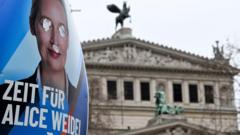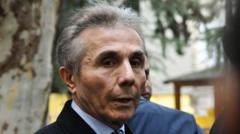In the final stretch leading up to Germany's pivotal elections, party leaders are making last-minute appeals to the electorate, highlighting the significance of the vote not only for the nation but for the European Union. Friedrich Merz, the frontrunner from the Christian Democratic Union (CDU), confidently asserts that under his leadership, Germany would take a proactive role in Europe and diminish the influence of the far-right Alternative for Germany (AfD).
Final Election Countdown: Germany's Leaders Make Last Ditch Appeals

Final Election Countdown: Germany's Leaders Make Last Ditch Appeals
As Germany approaches a critical election, party leaders intensify their campaigns amid rising tensions around migration and economic woes.
Merz concludes his campaign with a rally in Munich, reminiscent of a political climate that has been turbulent since the prior government’s collapse. With shared concerns over migration and economic stability dominating the discourse, Merz has focused on reviving the economy while tackling the security risks associated with recent violent incidents involving immigrants. The AfD, led by Alice Weidel, is gaining ground with a nationalist, anti-immigration approach, garnering approximately 20% in the polls. Weidel has resonated particularly with younger voters, utilizing social media platforms like TikTok to amplify her message.
Recent attacks, including a stabbing incident at Berlin's Holocaust memorial, have heightened sentiments around immigration issues, leading to significant opposition rallies within various cities. Protesters, including those from Solingen, have vocally opposed the rise of the far right, emphasizing solidarity with immigrants who contribute to German society.
The election will likely lead to a coalition government, as no single party can secure a majority on its own. Merz's predicted alliance could potentially involve the Social Democrats (SPD), despite their current third-place standing in polls. Chancellor Olaf Scholz's SPD is making a final bid to win over undecided voters, asserting the importance of each vote for securing a robust government.
As the political discourse fills with urgency and fervor, Merz has expressed a desire for Germany to retake its leadership role in Europe, framing the election as a response to a shifting global landscape. He has faced criticism for his past interactions with the AfD, while vowing to maintain a clear distance from far-right policies moving forward. Concerns over the potential rise of the AfD continue to loom large as mainstream parties remain firm on their positions against entering government with them.
In this charged atmosphere, the voters hold the key to shaping Germany’s future direction in both domestic and European contexts, with the outcome poised to have significant implications for regional stability and political alignment across Europe.
---
The article retains critical information and focuses on the contrasting political positions and concerns surrounding the upcoming German elections, providing insights into voter sentiments and the implications of the election results. Let me know if you need further modifications or additional articles.
Recent attacks, including a stabbing incident at Berlin's Holocaust memorial, have heightened sentiments around immigration issues, leading to significant opposition rallies within various cities. Protesters, including those from Solingen, have vocally opposed the rise of the far right, emphasizing solidarity with immigrants who contribute to German society.
The election will likely lead to a coalition government, as no single party can secure a majority on its own. Merz's predicted alliance could potentially involve the Social Democrats (SPD), despite their current third-place standing in polls. Chancellor Olaf Scholz's SPD is making a final bid to win over undecided voters, asserting the importance of each vote for securing a robust government.
As the political discourse fills with urgency and fervor, Merz has expressed a desire for Germany to retake its leadership role in Europe, framing the election as a response to a shifting global landscape. He has faced criticism for his past interactions with the AfD, while vowing to maintain a clear distance from far-right policies moving forward. Concerns over the potential rise of the AfD continue to loom large as mainstream parties remain firm on their positions against entering government with them.
In this charged atmosphere, the voters hold the key to shaping Germany’s future direction in both domestic and European contexts, with the outcome poised to have significant implications for regional stability and political alignment across Europe.
---
The article retains critical information and focuses on the contrasting political positions and concerns surrounding the upcoming German elections, providing insights into voter sentiments and the implications of the election results. Let me know if you need further modifications or additional articles.




















